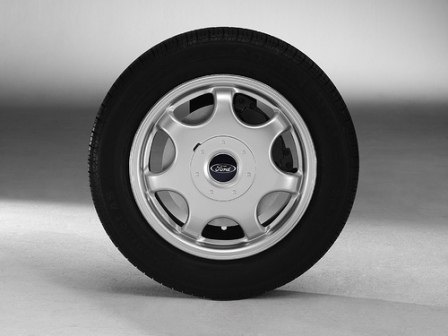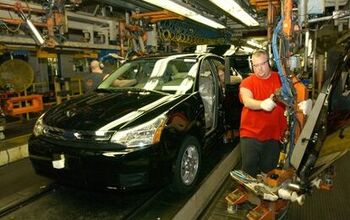Small Cars Make Money? Who'd a Thunk It?

The Wall Street Journal [WSJ] reveals the not-so-surprising fact that U.S. car buyers are trading down to smaller vehicles in the name of fuel economy– but they still want iPoditude, hands-free schmoozing and thermal butt management. Small car market share is climbing, from about 14 percent (2004) to over 19 percent (year to date). At the same time, the average small car price is heading upwards by some $2k – $3k. Ford Marketing Maven Jim Farley says around 30 percent of Foci are now top spec. Hang on. Does this mean that there's, you know, money in small cars? Yes! So "auto makers accustomed to building eight-cylinder cars loaded with options while sparsely equipping four-cylinder vehicles [not naming any names yet] have to adjust their production. GM President Fritz Henderson [there you go] said Wednesday that the company is trying to find more plant capacity to build more cars." Too bad GM can't convert all those truck factories to small car production. Who saw that one coming? To illustrate the premium compact trend, the WSJ brings us the ethnically-correct case study of Hugo Chau. Mr. Chau traded his 2005 Mercedes for a Sync-ed-up Ford Focus and said: "I really wanted a car that has the features and is nice to drive… The Mercedes was more like a toy, and this is something I can drive every day." What Merc was that, then? An SLR?

More by John Horner


































Comments
Join the conversation
"my base vw jetta was purchased for 18k 3 years ago with:... " VW is very well positioned to take advantage of this trend if they can get their act together.
VW definitely could do very well with current fuel prices. Even if they decide to keep TDI production lower (because people just go by pump prices and can't do simple math), they have plenty of efficient small displacement gas engines. The sad thing is that they seem to think that most of these engines are to "too small" for the US. The Rabbit and Jetta aren't very desireable in terms of economy. 30 MPG is pretty crappy compared to what they could be getting. The 1.6 litre FSI engine listed on vw.co.uk gets 42.2 MPG combined. I don't see why they continue to put a 2.5 litre engine in those cars. Maybe they'll catch on eventually though. I bought my Jetta TDI in 2003 because I knew at some point, fuel prices would go up. The only time I need a truck is to get stuff from Lowe's or Home Depot. For those occasions, I rent a truck for $20. It baffles me that so many people bought a pickup when they need to use its full capacity a few times per year. But as I mentioned above, a lot of people are pretty dull, so I guess I answered my own question.
When people ask me about my current car, Mazda6s, I first mention how much fun it is to drive then the gas mileage that I get (23 mpg in mixed driving, 28 to 30 mpg on long trips, since purchase 41,000 miles ago), and finally what a good deal I got on it by buying in December and doing a little leg work to find a left over one that I liked. When people would ask me about my previous car, a Saturn, the first thing I would mention was the deal that I got, and then I would just kinda' mumble "okay" as far as the car itself. Personally, I think Company's like Mazda have a good idea in selling cars like the Mazdaspeed3 that have standard features out the tail pipe. As gas prices continue to rise, a well appointed car that gets fair to good gas mileage will be the hot selling comodity for the middle class buyer that used to buy an SUV or full size sedan. There will also be a big market for the "penalty box" compact for kids just out of college, lower middle income folks, or people who like to own a basic daily driver and a toy for weekend fun.
brettc : MPG in the UK is not the same as MPG in the US, because an Imperial gallon is 1.2 American gallons. So, 42.2 / 1.2 = 35.2 MPG in US gallons. Still better than the bigger American engines, but not by as much.